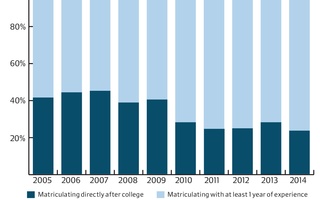With the semester coming to a close, some Harvard Law School students are continuing their push for changes they say will improve the school’s treatment of minority students, about a month after a high-profile racially charged incident shook campus.
In November, Law School students demanded a series of changes to the school, including replacing its controversial seal and creating a critical race theory program. Those demands, presented to the school’s administration at a recent town hall meeting, came as part of an activism effort that intensified after an incident involving pieces of black tape placed over the portraits of black professors sparked broader discussion about race at the school.{shortcode-a43f2718dca05a8c24787dd9b63d58b6f0049ca2}
Several weeks into the effort, the student activism has expanded in its reach and efforts. On Friday, more than a dozen students hosted a “teach-in” in the lobby of the office of Law School Dean Martha L. Minow, on whom students have called to do more to address their concerns.
For roughly an hour, students sat in the office and discussed the possibility of creating a critical race theory program at the school, according to Alexander J. Clayborne, one of the students organizing the protests. Clayborne said they spoke with Minow.
Minow had already met with some students about race relations at the school and made some proposals in response, including creating a committee to reconsider the school’s seal. Still, students are calling for further changes.
Beyond the Friday protest, student organizers have also launched a series of websites and social media pages about their efforts. A Twitter feed dubbed “@ReclaimHLS” features a series of photos of students with white boards stating why they became involved in the activism. The online pages are part of a broader effort to bring outside attention to the student movement, according to Clayborne.
“We’re just trying to raise awareness in any way that we can,” Clayborne said. “The idea is just to make sure that pressure from the outside is applied as well as from the inside.”
In an emailed statement, Minow wrote that she has been meeting with students and faculty members to “ensure inclusive and fair consideration of any ideas for change,” adding that she met with students for several hours last week and again Monday. Law School Dean of Students Marcia L. Sells, too, wrote in a statement that she and Minow have been working closely with students to discuss “what processes can work to achieve change at HLS.”
“With talent, hard work, patience, and humility, members of this community are proceeding with serious discussions that will enable all voices to be heard, and that will advance justice in our community and beyond our walls,” Minow wrote.
The final exam period has affected the student activism effort, according to Clayborne, but he said students have continued to meet with faculty members to discuss their list of demands. He said the group will continue to organize over break and that they are building momentum.
“We’ve become more organized over the past couple of weeks and we’re looking for ways to try and become more effective as a movement,” Clayborne said. “We’ll be here over J-term as well.”
The activism at Harvard Law School comes as racial tensions have flared on college campuses across the country. At Princeton, Yale, and Harvard College, students have challenged campus names and images with ties to slavery.
Clayborne pointed to recent developments at the College as a bellwether for change at the Law School. Earlier this month, Harvard’s undergraduate House masters unanimously agreed to change their title, which some students had criticized as being associated with slavery.
One of the primary demands of Law School students is removing the school’s seal, which they criticize for its ties to a slaveholding Harvard benefactor.
“Those kinds of things have been done right next door,” Clayborne said. “Why can’t they happen here?”
Still, change to the seal will not come immediately, if it does at all. A committee researching the seal will make its recommendations in March, and the decision of whether to change it will ultimately rest with the Harvard Corporation, the University’s highest governing body, according to Minow.
Law School professor Laurence H. Tribe argued in an email that changing the seal of a school is very different from changing a title.
“Renaming the position of ‘House Master’ to something less problematic like ‘Dean of the House’ is a lot easier than changing the school’s seal, which isn’t within the control of any dean or even the university president,” Tribe wrote.
—Staff writer Andrew M. Duehren can be reached at andy.duehren@thecrimson.com. Follow him on Twitter @aduehren.
Read more in University News
New Study Raises Questions of Access for HarvardXRecommended Articles
-
 Law School Admissions ‘Actively Preferences’ Work Experience
Law School Admissions ‘Actively Preferences’ Work Experience -
Deliberate ProgressProgress may be a duty on us all, but it must happen deliberately, with due consideration of consequences.
-
 Minow Calls on Michigan Graduates to Combat Injustice
Minow Calls on Michigan Graduates to Combat Injustice -
 Corporation Accepts Proposal to Change Law School Seal
Corporation Accepts Proposal to Change Law School Seal -
Law School Faculty Defend Minow, Criticize ActivistsA group of faculty members are publicly speaking out in support of Law School Dean Martha L. Minow, charging that student activists at the school have not given her due credit for her efforts to address racial issues on campus.













